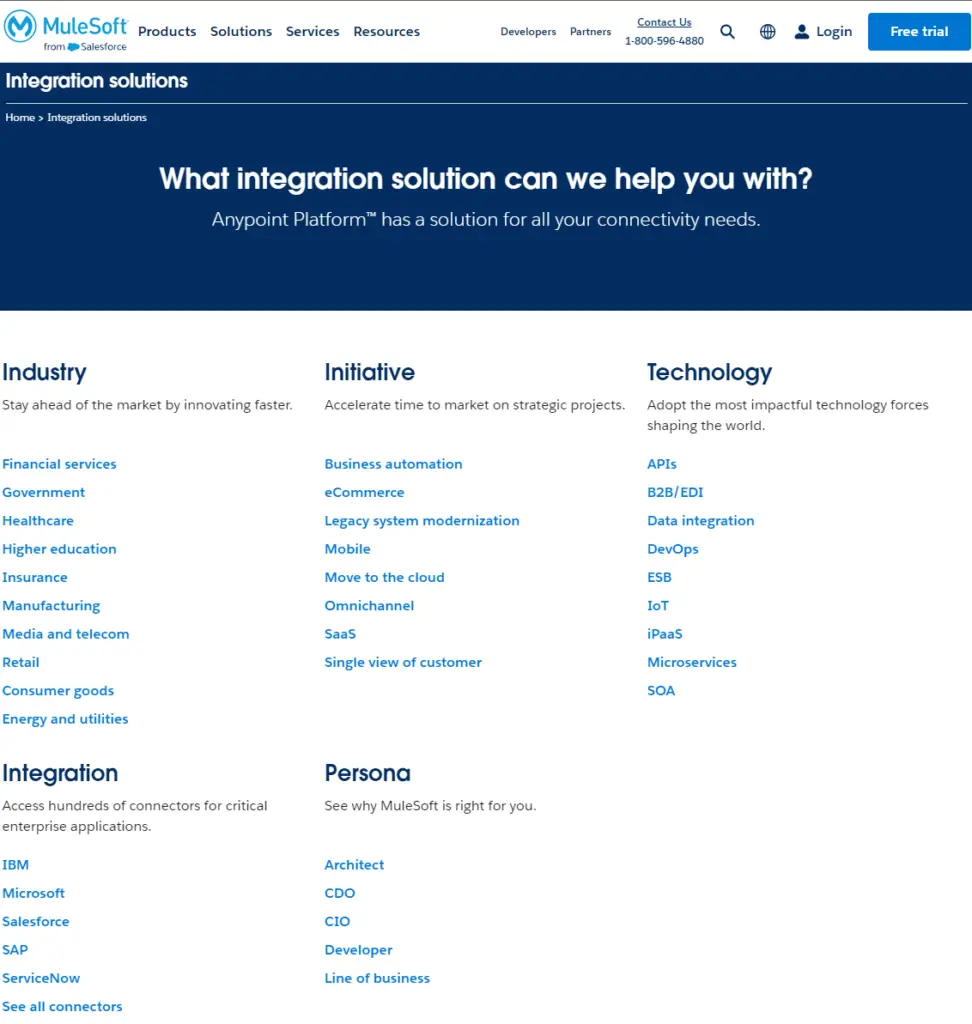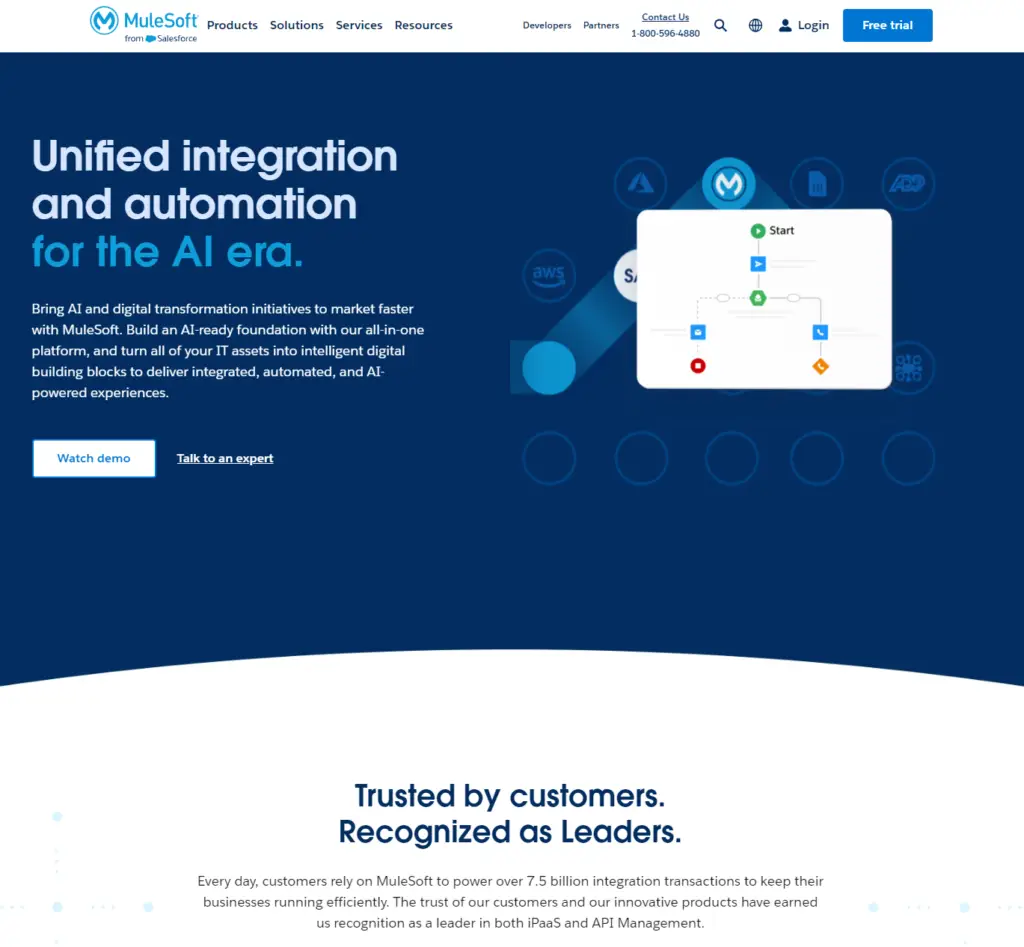Businesses require robust and flexible integration solutions to seamlessly connect various applications, data sources, and systems. Mulesoft, a leading integration platform, provides such solutions with its powerful Anypoint Platform. This platform allows businesses to design, deploy, and manage APIs and integrations, enabling efficient data flow and process automation across different environments.
Integration platforms like MuleSoft have become essential for modern businesses, ensuring interoperability and facilitating digital transformation. They help organizations streamline operations, enhance data accessibility, and improve overall efficiency. According to Digibee, integration is a key component of successful digital transformation strategies.
This comprehensive Mulesoft software review aims to delve into the features, performance, and user experience of Mulesoft, particularly focusing on its advancements and relevance in 2024. We’ll explore why Mulesoft continues to be a top choice for businesses looking to optimize their integration strategies.
What is Mulesoft?
Mulesoft is a comprehensive integration platform designed to connect various applications, data sources, and systems within an organization. Its primary objective is to facilitate seamless communication and data exchange across different environments, enhancing operational efficiency and enabling digital transformation.
At its core, Mulesoft offers the Anypoint Platform, an end-to-end solution for API management and integration. This platform provides a unified approach to design, deploy, and manage APIs and integrations, making it a versatile tool for businesses of all sizes. The Anypoint Platform integrates a range of functionalities that cater to diverse integration needs, including API design, development, testing, and monitoring.
Key features of Mulesoft include:
– API Management: Mulesoft allows users to design, publish, and secure APIs with ease. The platform supports API lifecycle management, ensuring that APIs are maintained and updated efficiently.
– Data Integration: With Mulesoft, businesses can connect disparate data sources, enabling real-time data access and synchronization. This capability is crucial for maintaining data consistency across various systems.
– CloudHub: As a core component of the Anypoint Platform, CloudHub provides a cloud-based integration platform-as-a-service (iPaaS). It enables users to deploy and manage integrations in the cloud, offering scalability and flexibility.
– Mule ESB: The Mule Enterprise Service Bus (ESB) is a robust integration engine that facilitates communication between applications and services. It supports various integration patterns and protocols, making it a versatile tool for complex integration scenarios.
– Visual Interface: Mulesoft offers a user-friendly, drag-and-drop interface for designing integrations. This visual approach simplifies the integration process, allowing users to create complex workflows without extensive coding.
Why Choose Mulesoft in 2024?
Integration software continues to evolve rapidly, driven by the increasing complexity of IT environments and the growing need for seamless connectivity. Current trends in integration software highlight the importance of robust API management, real-time data synchronization, and cloud-native solutions. As businesses adopt more cloud services and seek to integrate diverse systems, the demand for powerful integration platforms like MuleSoft is higher than ever.
MuleSoft maintains a strong position in the market for 2024, recognized as a leader in the integration platform-as-a-service (iPaaS) and API management sectors. Its comprehensive Anypoint Platform is celebrated for its versatility, scalability, and user-friendly interface, making it a top choice for enterprises seeking to streamline their integration processes.
Key Statistics and Insights:
- Market Leadership: MuleSoft holds a significant market share in the iPaaS sector. According to Gartner, MuleSoft is a leader in the 2024 Magic Quadrant for iPaaS, with a 15% market share, highlighting its dominance in the industry.
- Investment in API Management: A survey by Forrester revealed that 60% of enterprises plan to increase their investment in API management solutions. This trend underscores the growing importance of efficient and effective API management in modern business operations.
- Cost and Efficiency Improvements: Looking a this Salesforce report, MuleSoft users report a 70% reduction in integration costs and a 65% improvement in project delivery speed. These metrics demonstrate the platform’s ability to enhance operational efficiency and reduce the time to market for integration projects.
Recent updates and improvements in Mulesoft software review 2024 further solidify its market leadership. Key enhancements include:
– Enhanced API Management Capabilities: Mulesoft has introduced advanced features for API governance, security, and analytics, providing businesses with deeper insights and better control over their APIs.
– Improved Data Integration Tools: New data connectors and integration templates have been added, allowing for faster and more efficient data integration across various systems and applications.
– Cloud-Native Innovations: With a focus on cloud-native development, Mulesoft has optimized its CloudHub platform for better performance, scalability, and reliability. This includes support for containerization and Kubernetes, enabling more flexible and resilient deployment options.
– AI and Automation: Leveraging artificial intelligence and machine learning, Mulesoft now offers enhanced automation capabilities for integration processes. This helps reduce manual intervention, speeds up integration workflows, and ensures more accurate data handling.
– User Experience Enhancements: Continuous improvements to the Anypoint Platform’s interface and user experience make it easier for users to design, deploy, and manage integrations. This includes a more intuitive design environment and enhanced collaboration tools for development teams.
Key Features of Mulesoft
Mulesoft stands out as a leading integration platform due to its comprehensive set of features designed to streamline and enhance the connectivity between various applications, data sources, and systems. These features cater to diverse integration needs, ensuring that businesses can achieve seamless data flow and operational efficiency.

At the core of Mulesoft’s offerings is its robust API management capabilities. Mulesoft enables organizations to design, publish, and secure APIs effectively, providing a complete lifecycle management solution. This includes features for creating APIs from scratch, managing their deployment, monitoring their performance, and ensuring their security. The platform’s API management tools help businesses unlock the full potential of their data by making it accessible and reusable across different systems and applications.
Data integration is another critical feature of Mulesoft. The platform allows businesses to connect disparate data sources, ensuring real-time data access and synchronization. This capability is essential for maintaining data consistency and integrity across various environments. Mulesoft supports a wide range of data integration patterns and provides pre-built connectors for popular applications and databases, making the integration process faster and more efficient.
CloudHub is Mulesoft’s cloud-based integration platform-as-a-service (iPaaS), which offers a scalable and flexible environment for deploying and managing integrations. CloudHub simplifies the integration process by providing a fully managed, multi-tenant environment where users can deploy integrations without worrying about the underlying infrastructure. This cloud-native approach ensures high availability, robust security, and seamless scalability, making it ideal for businesses of all sizes.
Mule ESB (Enterprise Service Bus) is another cornerstone of Mulesoft’s integration platform. It facilitates communication between applications and services, supporting various integration patterns and protocols. Mule ESB provides a lightweight, yet powerful integration engine that can handle complex integration scenarios, making it a versatile tool for connecting on-premises and cloud-based systems.
In 2024, Mulesoft has introduced several new features and enhancements that further elevate its capabilities. One significant addition is the integration of artificial intelligence and machine learning to automate and optimize integration processes. This innovation helps reduce manual intervention, speeds up integration workflows, and improves data accuracy. Additionally, Mulesoft has enhanced its support for containerization and Kubernetes, allowing for more flexible and resilient deployment options in modern cloud environments.
Moreover, Mulesoft has focused on improving the user experience by refining its Anypoint Platform’s interface. The updated design environment is more intuitive and user-friendly, making it easier for users to create and manage integrations. Enhanced collaboration tools also enable development teams to work more effectively together, streamlining the integration lifecycle.
Overall, Mulesoft’s key features – including API management, data integration, CloudHub, and Mule ESB – combined with its continuous innovations, make it a powerful and versatile platform for addressing the diverse integration needs of modern businesses.
Security and Compliance
Mulesoft prioritizes security and compliance, offering advanced measures to protect data and ensure adherence to industry standards. The platform features robust security protocols, including OAuth 2.0 for authorization, TLS/SSL for encryption, and API gateway policies for threat protection and traffic management. Role-based access control (RBAC) further enhances security by restricting actions to authorized users.
Compliance is a core aspect of Mulesoft’s design, meeting requirements for GDPR, HIPAA, PCI DSS, and more. The platform provides tools for audit logs, data masking, and encryption to help organizations maintain regulatory compliance.
In 2024, Mulesoft introduced updates to bolster security, including machine learning algorithms for real-time threat detection and prevention. Enhanced compliance management tools now offer automated reporting and monitoring, while updated security dashboards provide comprehensive views of security metrics and incidents.
Mulesoft has also expanded its encryption support, including FIPS 140-2 compliant modules, ensuring data protection both at rest and in transit. These enhancements demonstrate Mulesoft’s commitment to providing a secure and compliant integration platform, giving businesses confidence in their data protection practices.
Pros and Cons
This Mulesoft software review offers a range of advantages that make it a popular choice for businesses seeking an integration platform. One of its primary strengths is its comprehensive API management capabilities, which allow organizations to efficiently design, deploy, and manage APIs throughout their lifecycle. This leads to enhanced connectivity and data flow across various applications and systems.
The platform’s data integration tools are another significant advantage. Mulesoft supports real-time data synchronization and provides pre-built connectors for numerous applications and databases, simplifying the integration process and ensuring data consistency. Additionally, the user-friendly, drag-and-drop interface of the Anypoint Platform makes it accessible to both technical and non-technical users, enabling faster development and deployment of integration solutions.
Mulesoft’s cloud-native features, particularly through CloudHub, offer flexibility and scalability, making it easier for businesses to manage integrations in a cloud environment. The platform also excels in providing robust security and compliance measures, ensuring data protection and adherence to industry standards.
However, Mulesoft is not without its drawbacks. One potential issue is the cost, which can be relatively high compared to other integration solutions, especially for small and medium-sized businesses. The pricing structure might pose a barrier for organizations with limited budgets. Additionally, while the platform is user-friendly, there is still a learning curve associated with mastering its full range of features and capabilities, which may require additional training and resources.
User perspectives on Mulesoft are generally positive, highlighting its powerful features and the ability to streamline complex integration processes. Many users appreciate the platform’s versatility and the efficiency gains it brings to their operations. However, some users have noted the high costs and the initial learning curve as challenges. Despite these drawbacks, the overall sentiment remains favorable, with Mulesoft being recognized for its reliability, robust performance, and comprehensive integration solutions.
Mulesoft vs. Competitors
When comparing Mulesoft software review to other integration platforms, several factors highlight its unique position in the market. While numerous integration solutions exist, Mulesoft distinguishes itself through its comprehensive feature set, robust performance, and strategic innovations.
Mulesoft offers a more extensive range of capabilities than many competitors, integrating both API management and data integration within a single platform. This holistic approach contrasts with other solutions that may excel in one area but lack depth in the other. For instance, some platforms focus primarily on API management without offering extensive data integration tools, whereas others might provide strong data integration capabilities but fall short on comprehensive API lifecycle management.
One of Mulesoft’s unique selling points is its Anypoint Platform, which seamlessly combines API management, data integration, and connectivity across on-premises and cloud environments. This integration is bolstered by a user-friendly interface that simplifies complex integration tasks, making the platform accessible to a broader range of users. The drag-and-drop design environment reduces development time and allows both technical and non-technical users to build and deploy integrations effectively.
Another significant advantage of Mulesoft is its CloudHub iPaaS offering. CloudHub provides a scalable, cloud-native platform that supports containerization and modern deployment practices, such as Kubernetes. This flexibility ensures that businesses can scale their integration efforts as needed, without being constrained by traditional infrastructure limitations. Competing platforms often lack this level of scalability and flexibility, which can limit their applicability in dynamic, large-scale environments.
Security and compliance are areas where Mulesoft particularly shines. The platform’s advanced security features, including OAuth 2.0, TLS/SSL encryption, and comprehensive identity and access management, provide a strong foundation for protecting data and ensuring regulatory compliance. This focus on security and compliance is critical for businesses operating in regulated industries and distinguishes Mulesoft from competitors who may not offer the same level of robust security measures.
In 2024, Mulesoft stands out due to its commitment to continuous innovation. Recent updates have introduced AI and machine learning enhancements that automate integration processes and improve data handling accuracy. These advancements demonstrate Mulesoft’s dedication to staying at the forefront of technology and addressing emerging business needs. Competitors may not match this pace of innovation, making Mulesoft a future-proof choice for businesses looking to invest in long-term integration solutions.
Ultimately, Mulesoft’s comprehensive feature set, user-friendly design, cloud-native capabilities, robust security measures, and commitment to innovation make it a standout choice among integration platforms. While other solutions may offer specific strengths, Mulesoft’s holistic and integrated approach provides unmatched versatility and effectiveness in meeting the diverse needs of modern businesses. This unique combination of features and forward-thinking development ensures that Mulesoft remains a leader in the integration platform market in 2024 and beyond.

